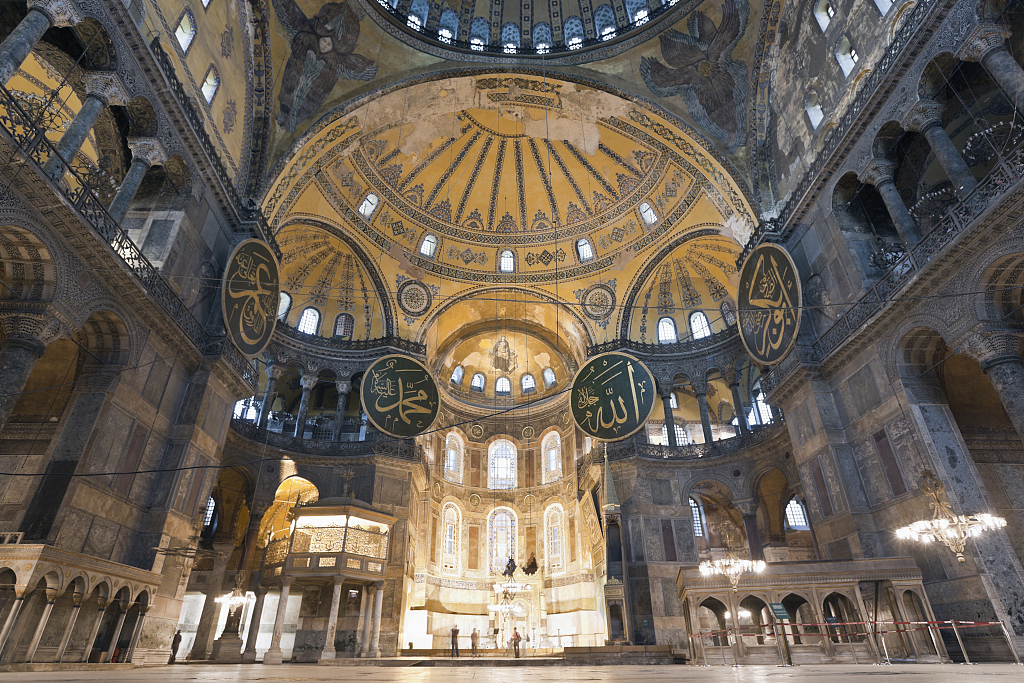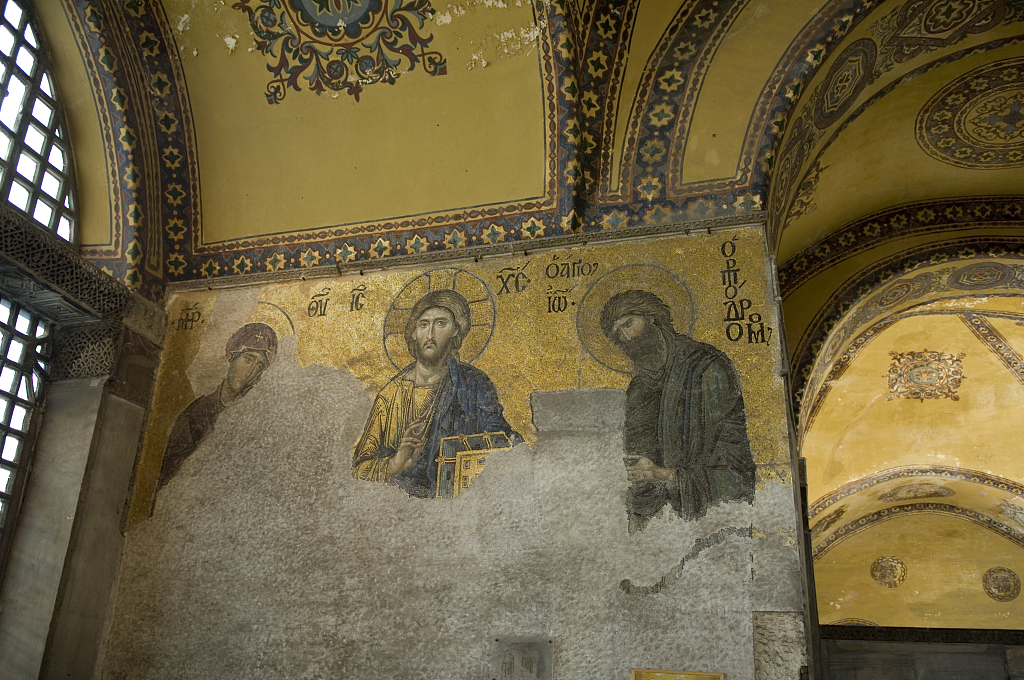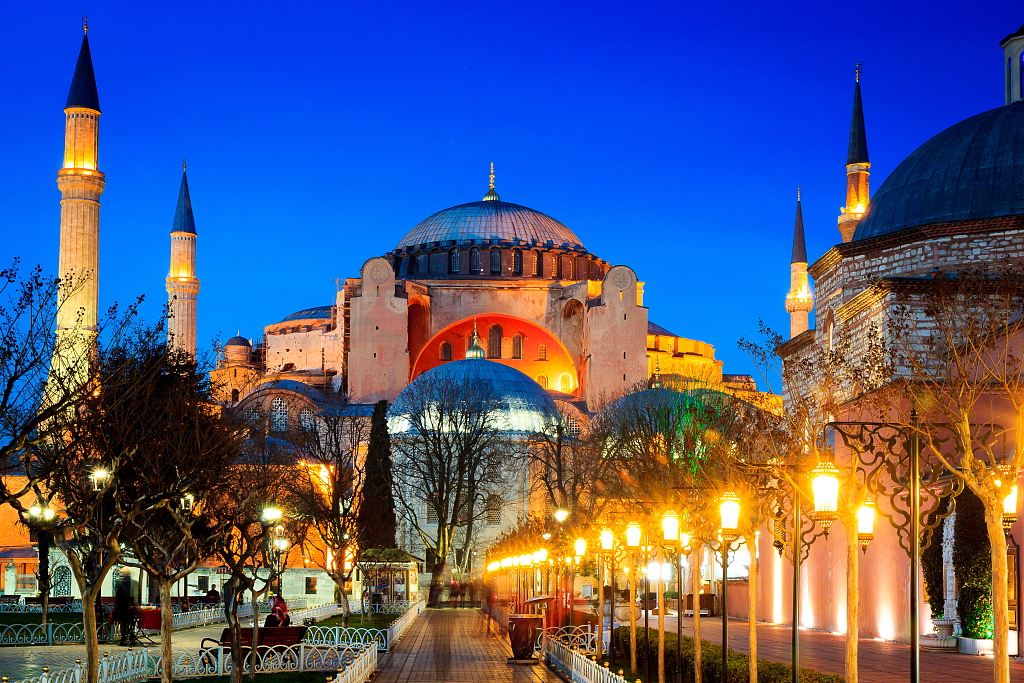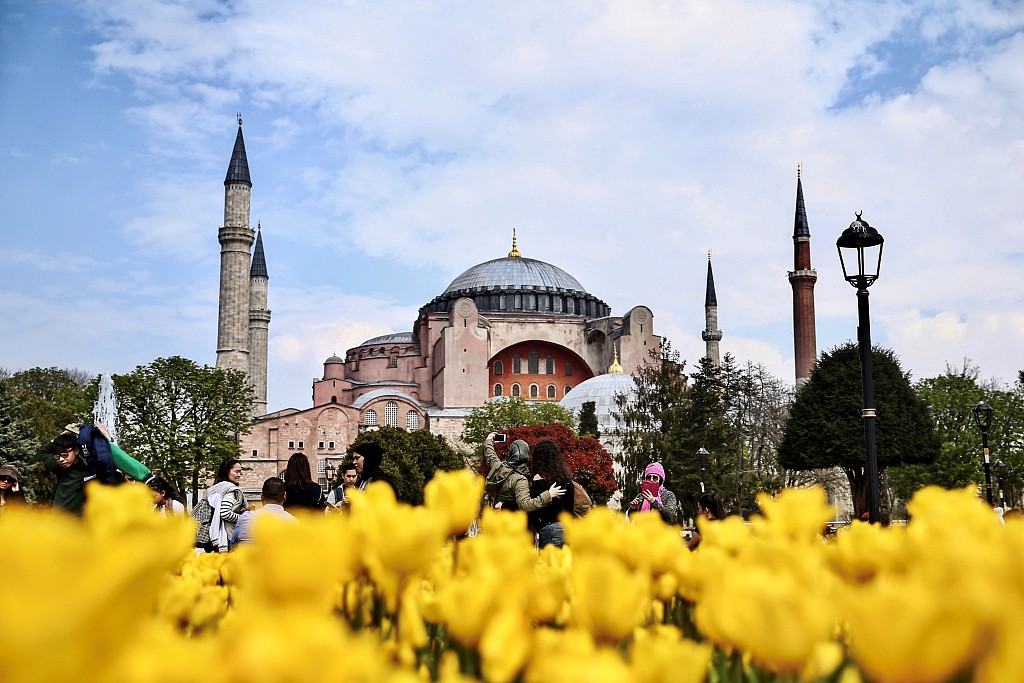A Turkish court said on Friday it annulled a 1934 government decree turning Istanbul's Hagia Sophia, or Ayasofya, into a museum, ruling it was unlawful, paving the way for the building's conversion back into a mosque despite international warnings against such move.
Turkey's President Recep Tayyip Erdogan told a press conference the first Muslim prayers would be held inside the building on July 24.
"Like all our mosques, the doors of Hagia Sophia will be wide open to locals and foreigners, Muslims and non-Muslims," he added.
Built in the early 6th century, Hagia Sophia was once the main church and spiritual center of the Orthodox. After the Ottoman Empire (1290-1922) conquest of Constantinople in 1453, the Hagia Sophia was converted into a mosque, which lasted until the early 20th century. After the founding of the Republic of Turkey, the building, which witnessed the rise and fall of several empires, reopened as a museum and became a symbol of the blending of East and West cultures and one of Turkey's most popular tourist attractions.
Founded in 537 AD, Hagia Sophia was the architectural wonder of the world, the pinnacle of Byzantine architecture, and the largest church in the world for nearly a thousand years.
After 1453, Hagia Sophia was converted into a mosque and was the first Royal Mosque of Istanbul designated by Mehmed the Conqueror, also known as Sultan Mehmet II (1432-1481).

The interior of the Hagia Sophia in Istanbul, Turkey. /CFP
The interior of the Hagia Sophia in Istanbul, Turkey. /CFP
Hagia Sophia's transformation is more "noble" than other buildings that were converted into mosques and renamed after the conquest. The new emperor did not rename it but changed Hagia Sophia to the Turkish spelling Aya Sofya. He allowed some Christian mosaics to remain, which he saw as guardians of the city.
The next turning point in Hagia Sophia's fate came in 1935, when Kemal Ataturk, the founding father of Republic of Turkey, decided to secularize the Hagia Sophia and turn it into a museum, saying it should be a monument to "all civilizations," welcoming visitors from all nations and faiths.
But the building is in a more fragile state than it seems. Some historians believe that Hagia Sophia did not have a long-term plan to protect its buildings from earthquakes and mosaics-peeling. Some scholars have compared it to the "Taj Mahal in Istanbul," and renovation is an emergency.
The damage to the Hagia Sophia happened quietly as time passed – large peeling ceilings, soggy walls, aging, faded paintings, over-burdened window frames that bent, dusty marble panels, and irreplaceable, non-renewable mosaics – all in desperate need of protection and repair.
Zeynep Ahunbay, an architecture professor in Istanbul, is known as Hagia Sophia's "guardian angel" for being involved in the Hagia Sophia's restoration since the 1990s. She said that funding for conservation is not always continuous.

The gold-colored wall painting on the wall of the Hagia Sophia in Istanbul, Turkey. /CFP
The gold-colored wall painting on the wall of the Hagia Sophia in Istanbul, Turkey. /CFP
"One year there is a budget, the next year there is none," she said to Smithsonian Magazine. "We need a permanent restoration staff, conservators for the mosaics, frescoes, and masonry, and we need to have them continuously at work."
"I am more interested in preserving Hagia Sophia as a cultural treasure," Ahunbay said to the New York Times, "The best way to preserve and present it is by the museum function."
Turkish law and agreements on monuments
The call to turn Hagia Sophia into a mosque appears to conflict with a number of domestic laws and some international conventions that the Turkish government has signed.
The Fourth Antiquities Code (1906) and Turkish Civil Code Law (1926) No. 1710, protected monuments as state properties, and established parameters for protection of historic buildings, such as Hagia Sophia, for most of the 20th century, said Cultural Property News.

Hagia Sophia in Istanbul, Turkey at night. /CFP
Hagia Sophia in Istanbul, Turkey at night. /CFP
In order to better deal with the increasing number of historic sites, in 1983, Law No. 2863 regarding the Protection of the Cultural and Natural Assets established both a Superior Counsel and Regional Counsels for the Protection of Cultural and Natural Assets of Turkey. This law places decision-making regarding the physical interference with, use, or change of purpose of cultural assets within the scope of the Ministry of Culture and Tourism in Turkey, which is directed to take advice from related professional institutions, such as museums, as Cultural Property News reported.
In the same year, Turkey ratified the Convention Concerning the Protection of the World Cultural and Natural Heritage (1972), an international convention that designates its member countries and areas to nominate World Heritage Sites, which included the Hagia Sophia. It also created the World Heritage Fund. The Convention states that while respecting national sovereignty, the signers to the Convention recognize that it is the duty of the international community as a whole to co-operate in protecting heritage.
Also, Turkey is a signatory to the Convention of the Architectural Heritage of Europe (1985), where it serves on the steering committee for Culture, Heritage, and Landscape.
In 2020, Hagia Sophia became the center of international discussion once again. UNESCO has expressed its concerns after Greece and Russia protested Turkey's decision to convert Hagia Sophia into a mosque.
UNESCO said it "deeply regrets" the decision to turn the museum into a mosque and called on the Turkish authorities to "open a dialogue without delay."
The organization had urged Turkey not to change its status without discussion.

Tulips are seen around the decorative pool at the Sultanahmet Square as Hagia Sophia at the background in Istanbul, Turkey, April 8, 2019. /CFP
Tulips are seen around the decorative pool at the Sultanahmet Square as Hagia Sophia at the background in Istanbul, Turkey, April 8, 2019. /CFP
Istanbul's tourism industry has grown rapidly in recent years. Before the COVID-19 pandemic, Istanbul was the third most visited city in Europe and the tenth in the world, with foreign visitors contributing 81.8 percent of total tourism revenue, according to Tourism Review.
Hagia Sophia is also a natural backdrop for many films and television programs, such as "Skyfall" and "Argo," as well as the humanistic documentary "Baraka."
Gli, a cat born in the Hagia Sophia, is also a "big star" on social media representing the heritage site with guides of Hagia Sophia happy to share Gli's story to visitors. Visitors are also very fond of taking photos with Gli that as one of the "guardians" of Hagia Sophia, is never afraid of taking photos with tourists.
Hagia Sophia's Asian-European culture background and Gli seem to be on display for tourists from around the world, as a monument that opens its doors to everyone, including its animals. But will it continue to be so?
Comments on social media have been mixed. Many on Twitter expressed their views on hashtag Hagia Sophia, which is based in Turkey and can be given an identity by Turkey. However, others said that considering the number of mosques in Istanbul, there is no need to change Hagia Sophia into a mosque.
Although Turkey's president has promised that Hagia Sophia will remain open to all visitors of all faiths, and Turkish officials said Christian emblems, including mosaics of the Virgin Mary which adorn its soaring golden dome, will not be removed, according to the BBC, many experts and industry insiders have expressed their concerns.
In a interview with the New York Times, Faruk Pekin, a leading tour guide, who specializes in cultural tours and led 80 nighttime tours of Hagia Sophia last year, said to be worried about the possibility of the mosaics being covered for Muslim prayers, including the seraphs high up at the base of the dome. Tourists and non-Muslims may be restricted to certain areas, he added.
Turkey's most famous author, Orhan Pamuk said the decision would take away the "pride" some Turks had in being a secular Muslim nation.
"There are millions of secular Turks like me who are crying against this but their voices are not heard," he told the BBC.
(Cover: Hagia Sophia in Istanbul, Turkey. /CFP)